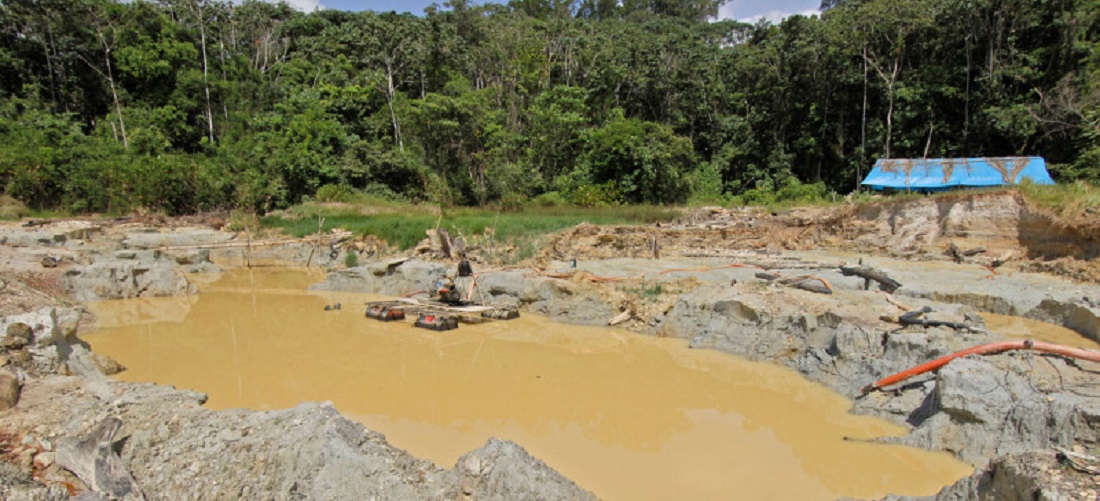
Swiss refineries put veto on Brazilian gold from the Amazon
Jun, 28, 2022 Posted by Gabriel MalheirosWeek 202226
Swiss gold refineries, among the largest in the world, have pledged not to import gold from indigenous territories in the Brazilian Amazon in an unprecedented declaration that illustrates the growing scrutiny surrounding materials extracted from the rainforest.
The Valcambi refineries, considered the largest in the world, Argor-Heraeus, Metalor, MKS Pamp, and PX Précinox, in addition to the Swiss Precious Metal Industry Association (ASFCMP), have taken “a commitment not to use gold from indigenous territories in the Brazilian Amazon.” It also pledged to “take all the technically and humanly possible measures not to accept, import or refine illegal gold, including that from Brazil, by tracking and identifying this gold.”
They also condemn and reject “any mining activity linked to protected areas of the Amazon without the free, prior, and good faith consent of the affected communities.”
Swiss refineries condemn the use of mercury and ask the Brazilian government to protect the environment and indigenous communities. These companies also cautioned the market about Bill 191/2020, which would open indigenous lands to mining and other commercial activities.
Such a decision is the result of dialogues between non-governmental organizations (NGOs) that met in Bern, the Swiss capital, with refineries and a delegation from the Amazon that included representatives of the Munduruku Wakoborun community (from Tajapós), the movement Xingu Vivo para Sempre, the Aliança Volta Grande Xingu, the Amazon Watch, mediated by the Association for Threatened Peoples (SPM).
Christoph Wiedmer, co-director of SPM, says that such a declaration of intent is unprecedented in Swiss history. The question now is how refineries will apply it, he says. No consensus has been reached on enhancing transparency in the gold supply chain for Switzerland.
“Brazilian authorities said that in 2020 and 2021, five tonnes of questionable gold went to Switzerland,” notes Wiedmer. “We are still looking for where that gold went because the Swiss refineries say they didn’t import it,” adds the director of the entity.
Christoph Wild, president of the Swiss Precious Metal Industry Association, says that Switzerland imports gold from all over the world, “including Brazil, although it imports only gold mined legally and in accordance with international standards.” He also said that the country does not import precious metals from the Amazon as it is very sensitive. He added that the joint statement with NGOs seeks to show Swiss commitment to only using sustainable supply chains.
Switzerland is the second largest gold importer in the world, the prominent exporter, and a global hub for trading precious metals. However, non-governmental organizations often complain that the country is far from being able to assess the origin of imported gold.
Globally, extraction operations resulted in 3,300 tonnes of gold in 2019. The largest producer was China, with 380 tonnes, followed by Australia, 325, and Russia, with 305. Brazil appears in the list with a production of 90 tonnes, and Peru, with 128 tonnes.
A report by the WWF organization estimates that between 50% and 70% of all gold traded in the world physically transits through Switzerland, which are figures that the industry disputes saying that such numbers vary depending on the definition employed and whether the numbers refer to mined gold, ingots, or other forms.
According to WWF, a large part of these volumes come from countries that do not produce the precious metal, such as the United Kingdom (imports of 130 tonnes), the United Arab Emirates (128 tonnes), and Italy (68 tonnes), through a commercial system with multiple facets that prevent gold traceability.
Last week, Swiss customs data showed that more than three tonnes of gold were shipped from Russia to Switzerland in May, the first significant shipment that occurred since the Russian invasion of Ukraine in February and thus a twist on international sanctions against Moscow. The G7 countries – the group of the seven largest economies in the world – decided to ban gold imports in a decision announced over the weekend in Germany.
Source: Valor Econômico
To read the full original article, please go to:
-
May, 31, 2023
0
Wilson Sons breaks cargo volume record at Tecon Santa Clara
-
Trade Regulations
Jan, 18, 2021
0
CAMEX expands tariff cuts and suspends anti-dumping to intensify combat against Covid
-
Other Cargo
Sep, 11, 2023
0
International slowdown affects Brazilian footwear exports, leading to record drop
-
Ports and Terminals
Oct, 23, 2023
0
Newly licensed Porto Paratudal Promises to Revolutionize Logistics in Brazil’s Hinterland by 2026


